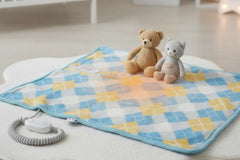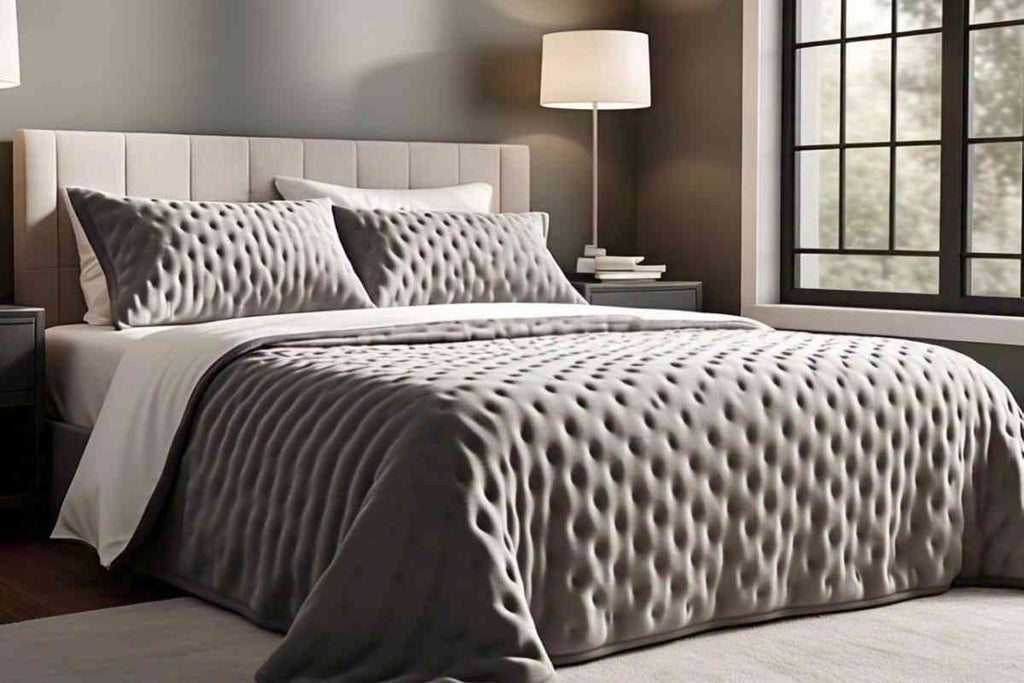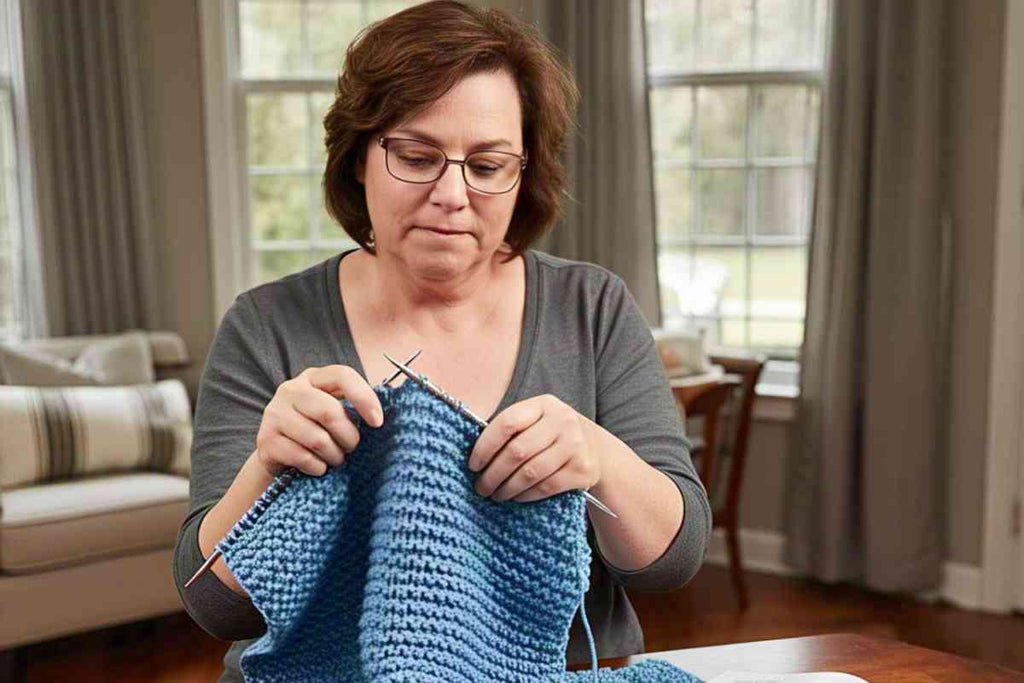Who Should Not Use a Weighted Blanket?

Not everyone should use a weighted blanket, even though they help many people sleep better. Some health issues can make them risky or uncomfortable.
If you're thinking about using one, it’s important to know when it might do more harm than good. Let’s look at who should avoid them and why it really matters.
Key Takeaways
Know the Risks: Weighted blankets aren’t safe for everyone, some health conditions can make them harmful.
Watch for Heat Sensitivity: If you have heart, skin, or respiratory issues, added warmth may worsen symptoms.
Mobility Matters: Limited strength or movement can make using or adjusting a weighted blanket difficult.
Choose Wisely: Pick a blanket under 10% of your body weight with breathable materials and helpful features.
- Consult Your Doctor: If you have medical concerns, check with a healthcare provider before using one.

Health Conditions That May Require Avoidance
Cardiovascular Conditions and Heat Sensitivity
- People with heart problems feel more heat than others: People with cardiovascular conditions like heart disease or high blood pressure are more likely to feel uncomfortable in warm environments. Using a weighted blanket that traps heat can make this worse. Since over 640 million people worldwide live with heart issues, this is a real concern.
- Too much warmth can make blood pressure drop suddenly: The heat under a weighted blanket can make blood vessels expand. This causes a drop in blood pressure, which can lead to feeling dizzy or even fainting, especially risky for someone who already has heart issues.
- The calming effect of the blanket can lower blood pressure even more: Weighted blankets are known to have a calming effect, which can further lower blood pressure. For people with heart conditions, this double drop (from heat and calm) might cause lightheadedness, especially when standing up.
- People with heart failure may feel worse under heat: For someone with congestive heart failure, heat from a weighted blanket can make symptoms worse. It can lead to more fluid retention and trouble breathing . Heat stress has also been linked to a higher chance of strokes, irregular heartbeat, and other serious heart problems.

Skin Disorders Prone to Irritation or Infection
- Retained heat from blankets can make skin problems worse: People with conditions like eczema, psoriasis, or rosacea may feel more irritation when heat and moisture build up under a weighted blanket.
- Constant pressure on the skin can lead to more flare-ups: When a blanket presses on sensitive skin, it can cause itching, redness, or swelling to get worse.
- Warmth trapped on wounds can increase chances of infection: If someone has cuts or open areas on their skin, the heat can trap bacteria and raise the risk of infection.
Respiratory Illnesses Aggravated by Heat or Humidity
- Hot weather makes it harder to breathe for people with lung problems: Respiratory issues like asthma, COPD, or sleep apnea can get worse when it's hot, especially if someone is using a heavy blanket that traps heat. The extra warmth in the air can make breathing feel more difficult.
- Humid and stuffy air can make breathing more uncomfortable: When the air feels heavy with moisture and there's little airflow, it becomes harder for people with breathing problems to stay comfortable. These conditions can lead to poor sleep and added stress on the lungs.
- People using CPAP machines need steady airflow without interruption: CPAP users rely on a steady stream of air while they sleep. If their mask or hose gets blocked due to heat or movement, it can make it harder for them to breathe properly and reduce the machine’s effectiveness.
- Using lighter and airy bedding can help people breathe easier: For anyone dealing with respiratory conditions, switching to lighter and breathable bedding materials can make sleep more comfortable. These materials reduce trapped heat and help maintain better airflow around the body.
Neurological Conditions Affecting Sensation or Awareness
- Risk of Pressure Sores and Circulation Issues: Without the ability to feel pressure or temperature changes, individuals may face risks like pressure sores or circulation problems, which can worsen their condition.
- Weighted Blankets Can Be Harmful for People with Epilepsy: For individuals with epilepsy, the deep pressure from weighted blankets can sometimes trigger discomfort or even seizures, so caution is necessary.
- Sensory Sensitivity Varies Among Neurological Conditions: While some find deep pressure soothing, others, especially those with autism or ADHD , might find it overwhelming, which could increase anxiety rather than help calm them down.
- Always Consult a Neurologist Before Using Weighted Products: Before using a weighted blanket or similar products, it’s important for individuals with neurological conditions to consult a neurologist to ensure it’s safe for them.
- Monitor Comfort and Temperature Closely: For people with neurological impairments, it’s crucial to monitor both comfort and body temperature closely to avoid potential health risks from impaired sensation.

Health Condition |
Should Avoid Weighted Blankets? |
Heart Disease |
Yes |
Hypertension |
Yes |
Eczema |
Yes |
Asthma |
Yes |
Parkinson's Disease |
Yes |
Arthritis |
Yes |
Physical Limitations and Mobility Issues when using weighted blanket
Difficulty Lifting the Blanket
Lifting a weighted blanket can be challenging for individuals with limited mobility. The extra pressure can be tough on muscles and joints. Using a blanket with handles or asking for assistance may help reduce strain.
Getting In and Out of Bed
Getting into bed with a weighted blanket can be tricky if you have mobility issues.
A good strategy is to adjust the blanket so it’s only on your lower body to start, then gently pull it up once you're comfortable. Consider using a bed with adjustable height or support bars to ease the process.
Restricted Movement
The comforting pressure of a weighted blanket may also restrict movement during sleep.
This can cause discomfort or stiffness, especially for people with limited mobility. Choosing the right weight is essential to avoid feeling trapped.
Pressure on Joints and Limbs
- Pressure from Weighted Blankets Can Aggravate Arthritis Pain: The pressure from a weighted blanket can cause discomfort, especially for people with arthritis, as it may worsen joint pain and make it harder to relax.
- Low Bone Density Increases Discomfort with Extra Weight: For those with bone density issues, the added weight of a blanket may cause discomfort or even minor injury, particularly on sensitive areas like the hips or ribs.
- Pressure on Healing Incisions Can Slow Recovery: Pressure on healing incisions or limited movement after surgery can make recovery harder, as the blanket may cause increased stiffness or discomfort in those areas.
- Lighter Weighted Blankets Are Gentler on Joints: A lighter weighted blanket provides comfort without putting too much pressure on sensitive joints, making it a better choice for people with mobility issues or joint pain.
- Even Weight Distribution Helps Relieve Joint Discomfort: When the weight of the blanket is evenly spread, it helps avoid putting too much pressure on specific joints or limbs, reducing pain and discomfort for the user.
Breathing and Circulation Concerns
People with breathing issues or circulation problems should be cautious. The pressure could affect breathing or blood flow. A lighter weighted blanket can provide gentle pressure without overwhelming the body.
Getting Out of a Recliner or Chair
Using a weighted blanket in a recliner can make it harder to stand up. Adjusting the blanket to allow more mobility or pushing it to the lap before standing can help. Assistive devices like grab bars or supportive chairs can ease movement.
Choosing the Right Blanket for Your Needs
- Choose the Right Weight for Comfort and Safety: Select a blanket that’s around 10% of your body weight. If you're unsure, go with the lighter option for a more comfortable fit.
- Pick Breathable Materials to Stay Cool: Go for fabrics like cotton, wool, viscose, or Tencel, which help keep you cool by wicking away moisture and allowing airflow.
- Look for Features That Improve Use: Removable covers, ties to keep the blanket in place, and handles for easy adjustment can all make your blanket more user-friendly.
- Ensure a Proper Fit to Avoid Constant Adjusting: A well-fitted blanket reduces the need for frequent adjustments, making your sleep experience smoother and more comfortable.
Risk Factors for Physical Discomfort
Overheating Concerns
- Your Body Starts Feeling Weak When It Gets Too Hot: Overheating can cause dizziness, fatigue, and heavy sweating. These signs often get worse when the place has poor air flow or feels stuffy.
- Getting Too Hot Can Dry You Out Fast: If overheating continues, it can lead to dehydration. This means your body is losing too much water, which can make you feel even more tired or unwell.
- Skin Shows Clear Signs When the Body Overheats: A person’s skin might turn pale or flushed, and feel cool or moist. These are physical signs that the body is struggling to handle the heat.
- Headaches and Nausea Are Warning Signals: As the body overheats more, people may get headaches, feel nauseous, or become very weak, these are all signs to take seriously.
- Noticing These Signs Early Can Keep You Safe: Paying attention to these warning signs can help prevent serious problems. Staying alert helps you stay safe in hot or poorly ventilated spaces.
Pressure Sensitivity
- Pressure sensitivity gets worse after an injury: When your body has gone through an injury or trauma, it can become more sensitive to touch or pressure. The healing process can make affected areas feel sore or tender for a long time.
- Sitting or standing the wrong way can increase pressure pain: Poor posture can put stress on muscles and joints, which makes the body more sensitive in those areas. Over time, this adds to physical discomfort when pressure is applied.
- Some health problems can make even light pressure painful: Conditions like fibromyalgia cause the body to react more strongly to pressure. These conditions often bring pain, tiredness, and make you more sensitive all over your body.
- Joints and nerves can overreact to pressure: If your joints or nerves are already sensitive, even normal pressure can feel uncomfortable or painful. This overreaction is common in people with nerve or joint issues.
- Stress can make your body feel more sensitive to touch: Emotional stress doesn’t just affect your mood, it also affects your body. When you're stressed, your sensitivity to pain and pressure can increase, making everything feel worse.
Age-Related Considerations
Infants and Toddlers
- Infants and toddlers can’t safely use weighted blankets: Weighted blankets should never be used for babies or toddlers because they can’t move them off their bodies. This puts them at serious risk of suffocation or injury during sleep.
- Children under 3 are too young for any kind of heavy blanket: Toddlers and infants don’t have the strength or body control needed to safely use weighted blankets. Even lighter ones can be dangerous at this age.
- Sleep sacks or wearable blankets are much safer: Instead of weighted blankets, it's better to use sleep sacks or wearable blankets for calming young children. They offer comfort without the risk of suffocation.
Elderly Individuals
Older adults may face decreased mobility, weakened muscles, and joint pain. A lighter blanket may provide comfort without compromising ease of movement.
Approximately 35% of adults aged 70 experience mobility limitations, and the number rises sharply after age 85, making heavy blankets more difficult to manage.
Consider fabric type and ease of cleaning when selecting a blanket for an elderly person.
When to Seek Medical Advice
It’s important to talk to your doctor before using a weighted blanket if you have serious medical conditions or mobility limitations.
Be alert to symptoms such as shortness of breath, chest pain, skin irritation, or difficulty moving. If unsure, seek medical guidance.
FAQs
Can people with anxiety or PTSD safely use a weighted blanket?
Yes, many individuals find weighted blankets helpful for anxiety or PTSD. The gentle pressure may reduce stress and improve sleep. Start with a lighter option and consult a therapist or doctor if unsure.
Is it safe to use a weighted blanket during pregnancy?
In most cases, yes. A lighter blanket is recommended, and it should not be placed directly on the abdomen. Always consult with a doctor, especially during late pregnancy.
Should people with sleep apnea or CPAP users avoid weighted blankets?
They can use them cautiously. Heavier blankets may make breathing more difficult or interfere with CPAP equipment. A lighter blanket is safer, and users should ensure nothing obstructs their mask or hose.
Are weighted blankets appropriate for people with sensory processing disorders?
Yes, many people benefit from deep pressure stimulation. However, some may feel overwhelmed. Personal comfort and professional advice should guide the choice.





